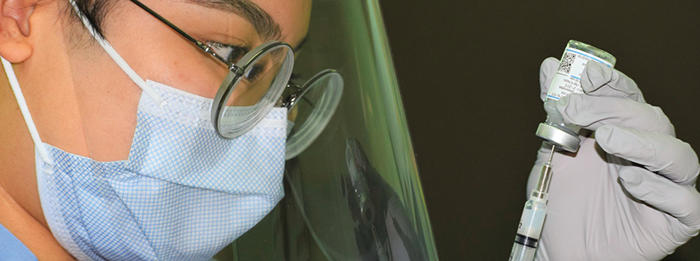
By Sean Delaney
Did you know the COVID-19 vaccines have been rigorously tested by numerous trusted authorities around the world, including Health Canada? And they are shown to be safe and effective at protecting against COVID-19?
However, if you’re concerned about the safety of the vaccine, please speak to your primary care provider.
Like all vaccines, side effects may occur, but serious side effects are rare. Side effects may include pain at the injection site, headache, fatigue, muscle and joint pain, chills, and fever. These side effects are often the body’s response to developing immunity.
The vaccines require two doses to be fully effective, and an appointment for your second dose will be made after you receive your first dose, in some cases up to four months apart.
Protecting yourself, protecting your communityImmunization is the best way to protect yourself and others against COVID-19. The more people that are vaccinated, the more we reduce the risk of spreading COVID-19.
If you have questions about COVID-19 vaccinations, visit:
www.toronto.ca/home/covid-19/covid-19-protect-yourself-others/covid-19-vaccines/About COVID-19COVID-19 is a new respiratory disease caused by the SARS-CoV-2 virus. COVID-19 can spread from person to person through respiratory droplets or by touching something that had the virus on it.
Most people infected with COVID-19 will experience mild to moderate illness, while others may have no symptoms at all. Some individuals, especially seniors and those with underlying medical conditions or weakened immune systems, are more likely to develop serious illness.
Variants, what are they?When a virus infects someone, it replicates or makes copies of itself, which can cause changes known as, mutations. A virus with one or more new mutations is known as a variant of the original virus.
All viruses, including the virus that causes COVID-19 (SARS-CoV-2), change over time, and it’s common to expect new variants to appear.
Most mutations have little to no impact, while others can change a virus’ characteristics, such as how it spreads and the severity of disease it causes.
COVID-19 variants of concernAmong the virus that causes COVID-19, there are currently three main variants of concern. These include the B.1.1.7 (first identified in the United Kingdom), B.1.351 (first identified in South Africa), and P.1 (first identified in Brazil). Information on these variants is rapidly evolving.
These variants are concerning because they appear to spread more easily and quickly than others. There are studies underway to confirm whether B.1.1.7 leads to more severe outcomes. There is also some evidence that both the B.1.351 and P.1 variants may increase the risk of being infected again. This means people who have already had COVID-19 could be infected again by these strains more easily.
Public health authorities are learning more about the effectiveness of approved vaccines against the variants of concern. So far, there is no sign that the approved vaccines will be less effective against the new B.1.1.7 variant, although studies are ongoing. There is some evidence that current approved COVID-19 vaccines could be less effective against the B.1.351 and P.1 variants.
The same actions we take to prevent COVID-19 will be effective in protecting our community against these variants.
It’s important to continue to follow public health protocols, limit contact with others and avoid all non-essential travel to reduce the spread of the virus and any of its variants.
And get your shot when it’s your turn.














